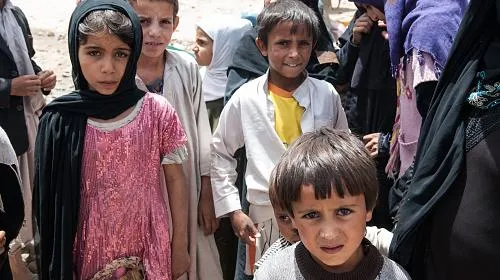AMMAN (June 11, 2018) – As the offensive on the key Yemeni port of Hodeidah has begun, CARE warns that this will have a catastrophic impact on the civilian population. “We have had more than 30 airstrikes within 30 minutes this morning around the city. Some civilians are entrapped, others forced from their homes. We thought it could not get any worse, but unfortunately we were wrong,” says Jolien Veldwijk, CARE’s acting country director in Yemen. “This attack risks more people dying, but it also risks cutting the lifeline of millions of Yemenis. Food imports already reached the lowest levels since the conflict started and the price of basic commodities has risen by a third. We are gravely concerned that parts of the population could experience famine,” says Veldwijk.
According to the UN more than a quarter million people could lose everything, including their lives. The civil war in Yemen has already cost the lives of more than 10,000 people, and is labeled as today’s worst humanitarian disaster. More than 22 million people are in need of humanitarian assistance and protection, more than 8 million people already face the risk of starvation.
“The attack on Hodeidah as the main point of entry for aid in Yemen will multiply horror and death in Yemen,” says Veldwijk. “We urge all parties to refrain from any further military activities in and around Hodeidah city and the port. People are already exhausted, starving, and have no means to cope with any further escalation of war.”
CARE works in Hodeidah governorate to support people with access to safe water and increased food security by providing cash to the most vulnerable households. CARE has worked in Yemen since 1992, and is one of few international aid agencies continuing to deliver humanitarian services under extremely challenging circumstances. CARE is focusing on making sure that people in the hardest-hit and most hard-to-reach areas have access to emergency supplies and assistance with meeting their basic needs.
About CARE
Founded in 1945 with the creation of the CARE Package®, CARE is a leading humanitarian organization fighting global poverty. CARE places special focus on working alongside women and girls because, equipped with the proper resources, they have the power to lift whole families and entire communities out of poverty. That’s why women and girls are at the heart of CARE’s community-based efforts to improve education and health, create economic opportunity, respond to emergencies and confront hunger. Last year CARE worked in 93 countries and reached more than 63 million people around the world. Learn more at care.org.
Media contacts:
Mahmoud Shabeeb, mshabeeb@care.org, +962-79-146-39-03, Skype: mahmoud.shabeeb_1 (based in Amman, Jordan)
Nicole Harris, nharris@care.org, 404-735-0871

